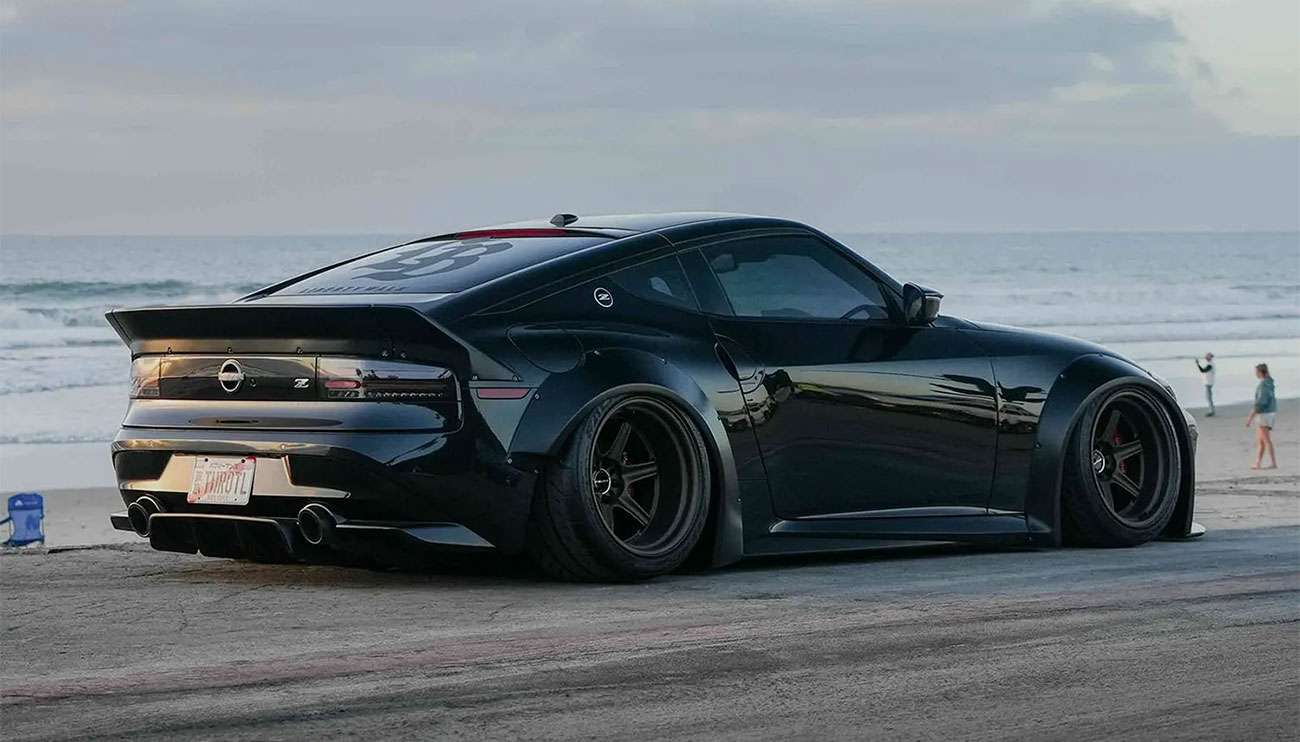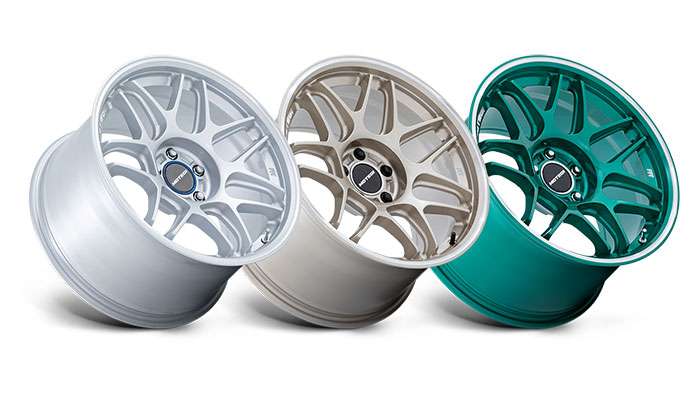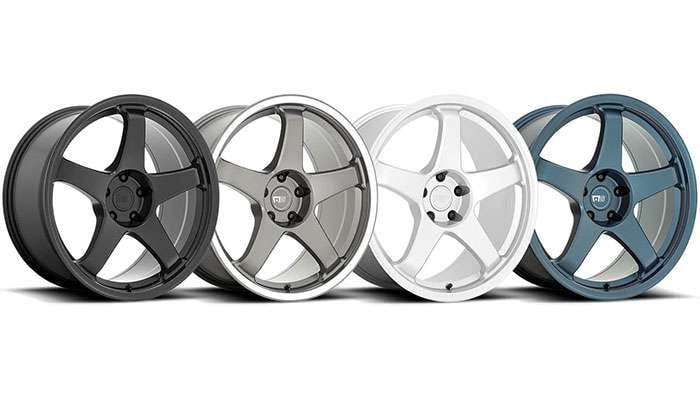
Motegi wheels stand as one of only two wheel brands to have partnered with Ferrari, a partnership that speaks directly to their reputation for exceptional quality in the performance wheel market. Founded in 1995, Motegi Racing has built high-performance wheels that deliver both form and function, establishing themselves as a serious player in both street and track applications.
Our testing reveals whether Motegi wheels live up to their prestigious partnerships. The engineering behind these wheels starts with lightweight designs that actually perform. The Motegi MR145 features a thinner 6-spoke design weighing just 19.73 lbs, while their MR148 wheels start at an even lighter 16.98 lbs for the 15×7 size. These wheels don't just look good - they're designed to boost vehicle handling through their lightweight construction.
Motegi offers multiple manufacturing methods to fit different needs and budgets. Their cast wheels begin around $150, with an upgrade to flow-formed technology available for approximately $100 more per wheel. For track use, their wheels have demonstrated excellent durability and heat resistance in racing conditions, with every wheel undergoing rigorous strength and safety checks. Motegi rims carry JWL and VIA certifications, industry standards that verify their quality and performance.
Our real-world street and track testing examines how these wheels perform across different driving conditions, analyzes their value proposition at various price points, and helps you determine if they deserve a place on your vehicle.

Motegi's manufacturing approach centers on three distinct wheel technologies, each designed for specific performance requirements and budget considerations. Understanding these differences helps you choose the right wheel for your driving needs.
Cast wheels form the foundation of Motegi's lineup, created by pouring molten aluminum into molds that cool and harden to form the wheel shape. These one-piece wheels serve daily drivers who want improved appearance without the premium price. Various cast wheel styles start at $150, making quality aftermarket wheels accessible to more enthusiasts.
Despite their budget-friendly pricing, these wheels undergo rigorous testing to ensure structural integrity and safety for street applications. The casting process allows for complex designs and finishes while keeping costs manageable for everyday use.
Flow-formed technology represents a significant step up from basic casting, adding approximately $100 per wheel to the base cost. The process begins with a cast wheel that undergoes additional manufacturing—the barrel gets spun, heated, and pressed between steel rollers that pull the rim to its final dimensions.
This manufacturing method creates wheels like the MR161 Kojin (starting at $269) that deliver enhanced strength-to-weight ratios. Flow forming changes the aluminum's grain structure, creating a wheel that bridges the gap between affordable cast options and premium forged wheels.
At the top of Motegi's range sit their 2-piece forged wheels, engineered specifically for serious track applications. Each wheel uses aerospace-grade 6061-T6 forged aluminum, delivering exceptional strength while maintaining minimal weight for demanding performance use.
Motegi's 2-piece welded configuration combines the customizability of multi-piece wheels with the simplicity of monoblock design. Manufactured in Corona, California, these wheels allow for custom specifications that work perfectly with modified track vehicles.
All Motegi wheels carry Japanese Light Alloy Wheel (JWL) and Vehicle Inspection Association (VIA) certifications. The JWL standard covers multiple tests including cornering fatigue, impact resistance, and radial load tests. VIA certification adds another layer of validation, with the Vehicle Inspection Association conducting independent testing to verify compliance with stringent Japanese safety standards.
These certifications provide assurance that Motegi wheels meet established industry benchmarks for quality and durability across their entire product range.

Testing identical vehicles with different wheel configurations revealed important insights about how these wheels perform beyond their specifications. The results show exactly where Motegi wheels excel and where potential buyers need to pay attention.
The Motegi MR131 Traklite weighs 17.6 lbs in 17x8 configuration, just 0.4 lbs heavier than Konig's comparable Hexaform at 17.2 lbs. The MR145 TrakLite 3.0 delivers even better results—weighing only 21.03 pounds at its largest size. When we tested the 18-inch models, the actual weight came in at under 20.5 pounds, actually lighter than advertised. This represents excellent value considering flow-formed wheels deliver 90% of forged wheel benefits at half the cost.
The lightweight construction of Traklite wheels noticeably improved handling response during track testing. High-speed cornering revealed how reduced unsprung weight allows for quicker direction changes. Testing confirmed what Motegi claims—their aluminum alloy construction genuinely enhances grip, acceleration, and cornering performance.
Street testing showed Motegi wheels reduce vibration, providing a smoother driving experience. However, one tester with 18" Traklites reported slightly worse everyday ride quality compared to heavier stock wheels. Worth noting if comfort ranks as your top priority.
Multiple track sessions demonstrated excellent heat resistance from the flow-formed wheels. Their specialized manufacturing process changes the aluminum's grain structure, allowing them to maintain strength with less material. This creates remarkable durability under high-stress conditions.
Brake Clearance requires careful consideration when selecting wheels. One Outback owner discovered the 17x7 Motegi wheels wouldn't fit due to potential caliper clearance issues, though the 17x8 and 18x8 did fit properly. Testing revealed their stated fitment specifications to be reliable when properly matched to vehicle requirements.
The cost-to-performance ratio shows exactly why Motegi wheels have gained popularity among performance enthusiasts across different budgets.
Motegi's value proposition starts with their cast aluminum wheels beginning at approximately $150. This makes them surprisingly affordable for a brand with Ferrari partnerships. Their cast lineup offers solid options like the MR116 FS5 starting at $173 and the MR142 CS8 at $199. These entry-level wheels target daily drivers and newcomers to wheel modifications who want quality without breaking the bank.
Spending roughly $100 more per wheel gets you into Motegi's flow-formed technology with substantial performance gains. These wheels are 15% lighter and noticeably stronger than traditional cast options. The manufacturing process fundamentally changes the aluminum's grain structure, delivering nearly 90% of forged wheel benefits at half the cost. This represents outstanding value for performance enthusiasts.
Motegi's premium 2-piece forged wheels feature both forged barrels and centers, unlike competitors who often cut corners with cast centers. While priced over $1000 per wheel, these custom-specification wheels become essential for specialized track builds where standard forged options don't offer the needed fitment.
Against competitors, a 17x8 Motegi Traklite (17.6 lbs) comes remarkably close to Konig's Hexaform (17.2 lbs) while typically saving $100-300 per set. At Performance Plus Tire, we carry the best selection of Motegi wheels at competitive prices. Browse our complete selection at Performance Plus Tire to find your perfect balance of cost and performance.
Beyond performance specs and pricing, Motegi's after-purchase support shows their commitment to standing behind their products.
Motegi wheels come with a lifetime structural warranty for the original retail purchaser under normal usage conditions. For material and workmanship defects, they offer a standard one-year warranty from the date of purchase. Finish protection varies by type:
Chrome and painted aluminum finishes: 1-year warranty against peeling or lifting
PVD finishes: 2-year coverage
Polished aluminum (without clear coat): No warranty coverage as these require regular maintenance
The warranty becomes void if damage occurs from improper maintenance, accidents, or racing applications. Steel wheels receive a shorter 90-day warranty for paint and plating issues.
To initiate a warranty claim, owners must return the wheel to their original dealer along with the purchase receipt. The dealer then determines if the wheel qualifies for warranty service. Customer reports indicate Motegi provides timely responses to technical questions about fitment and brake clearance. Warranty repairs or replacements don't include costs for removal, shipping, or reinstallation.
Motegi offers practical online tools that make the ownership experience smoother. Their website features:
Vehicle-specific configurator to search compatible wheels by year, make, and model
Visual preview of wheels on vehicle images
Dealer locator for local support
Information about hub-centric rings and their importance
Guidance for wheel inspection after road incidents
They maintain a separate accessory website (wheelacc.com) where owners can purchase replacement center caps and hardware.
Our extensive testing confirms that Motegi wheels deliver on their Ferrari partnership reputation. The performance wheel market has few brands that can match this combination of engineering quality and practical value across multiple price points.
The tiered manufacturing approach works particularly well for different driving needs. Cast wheels provide solid daily-driving performance at just $150, while flow-formed technology unlocks significant benefits for roughly $100 more per wheel. Those requiring custom specifications for serious track applications will find the 2-piece forged wheels justify their premium pricing.
What stands out most is the honest specifications. The MR145 TrakLite wheels actually weighed less than advertised during our testing, demonstrating Motegi's commitment to accurate product information. Flow-formed wheels delivered nearly 90% of forged wheel benefits at half the price—exceptional value for performance enthusiasts.
Street testing showed these wheels maintain comfortable daily driving characteristics despite their lightweight construction. Track sessions confirmed excellent heat resistance and durability under demanding conditions. Some larger sizes do transmit slightly more road feedback than stock wheels, which is worth considering based on your comfort priorities.
Whether you're building a street car or track weapon, Motegi offers wheels that balance performance, durability, and value effectively. You can explore their complete range at Performance Plus Tire to find the perfect match for your specific needs and budget.
The warranty coverage adds further value, though racing applications void coverage as expected. These wheels represent a rare blend of engineering, aesthetics, and accessibility that few competitors can match across such diverse price points.
After extensive street and track testing, here are the essential insights about Motegi wheels that every potential buyer should know:
• Motegi offers three manufacturing tiers: Cast wheels start at $150, flow-formed adds $100 more for 90% of forged benefits, and 2-piece forged provides custom track specifications over $1000.
• Weight performance exceeds expectations: The MR145 TrakLite actually weighs less than advertised at under 20.5 lbs, delivering noticeable handling improvements through reduced unsprung weight.
• Flow-formed technology provides exceptional value: For roughly $100 more than cast wheels, you get 15% lighter weight and significantly stronger construction with altered aluminum grain structure.
• Track durability is proven: Wheels demonstrated excellent heat resistance and maintained structural integrity through multiple high-stress track sessions with proper brake clearance.
• Comprehensive warranty coverage included: Lifetime structural warranty for original purchasers, plus 1-2 year finish protection depending on wheel type, though racing voids coverage.
Motegi wheels successfully bridge the gap between affordable daily driving and serious performance applications, making them a smart choice for enthusiasts seeking proven quality without premium pricing.
Yes, Motegi wheels are designed for both street and track applications. Their lightweight construction improves handling on the street, while their heat resistance and durability make them suitable for demanding track conditions.
Motegi wheels are highly competitive in terms of weight. For example, the Motegi MR131 Traklite (17x8) weighs only 0.4 lbs more than the comparable Konig Hexaform, making them an excellent choice for performance enthusiasts.
Motegi offers three main manufacturing processes: cast wheels for entry-level daily use, flow-formed wheels for balanced performance and price, and 2-piece forged wheels for custom track builds. Each process caters to different performance needs and budgets.
Motegi wheels offer good value for money across their range. Their cast wheels start at $150, while flow-formed options provide significant performance benefits for about $100 more. The 2-piece forged wheels, though pricier, are valuable for specialized track applications.
Motegi provides a lifetime structural warranty for the original retail purchaser under normal usage conditions. They also offer a one-year warranty for material and workmanship defects, with varying coverage for different finishes. However, the warranty becomes void if damage occurs from improper maintenance, accidents, or racing applications.